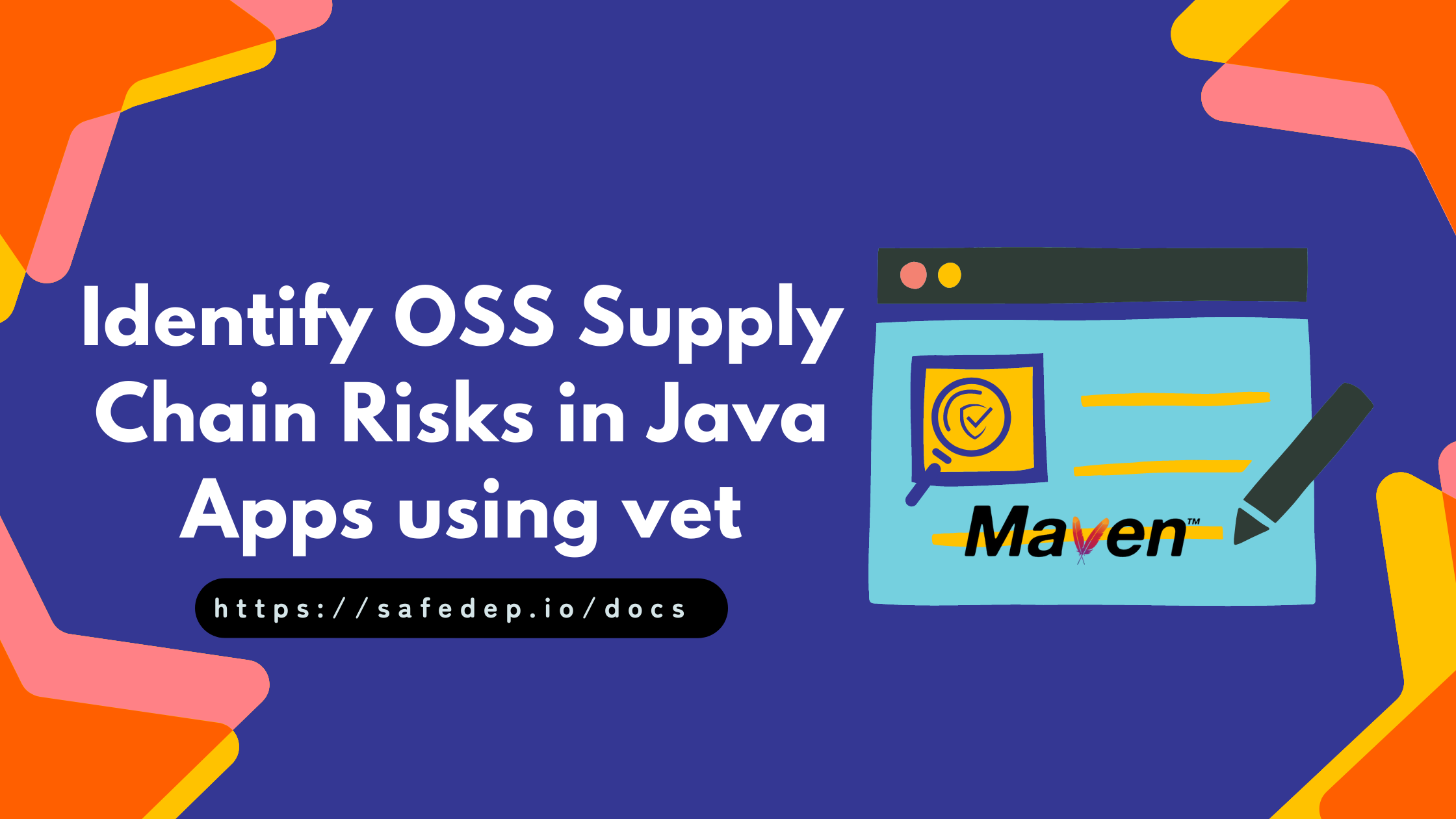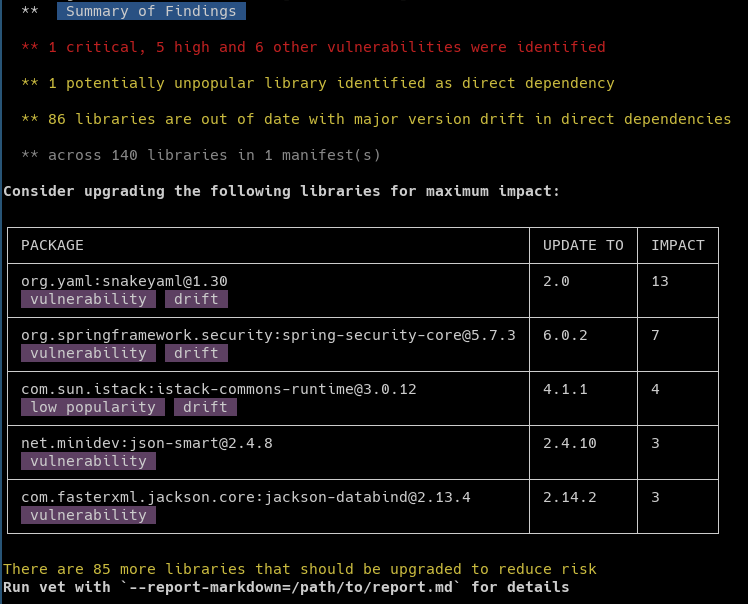Identify OSS Supply Chain Risks in Java Apps using vet

🤔 What is vet?
vet is a tool for identifying risks in OSS supply chain. Refer to
quickstart for instructions to setup vet in your system.
🤖 How to setup vet?
You can skip this section if you already have
vetsetup and configured
The easiest way to get started is to download a precompiled binary from Github
Releases or by using homebrew
brew tap safedep/tapbrew install safedep/tap/vetvet needs an API key to fetch enrichment data from backend. Get one sent to
your email address
vet auth trial --email [email protected]You will receive an API key in your email
Configure vet to use the API key
vet auth configureVerify setup and API key
vet auth verify⚙️ Analysing Java App
The instructions here assumes
vetis installed and setup with an API key.
Clone demo-java-client which is a Java Springboot application with
intentionally risky dependencies
git clone https://github.com/safedep/demo-client-javaSwitch to the app directory
cd demo-client-javaRun a quick scan using vet to identify top risks
vet scan --json-dump-dir /tmp/dcj-dumpYou can optionally using
--transitiveargument to enable transitive dependency resolution during scan

vet uses an opinionated workflow to identify and prioritised risky OSS
libraries identified in the project. However the query workflow
can be used to slice and dice on raw data to identify risky dependencies.
Identify dependencies with critical or high vulnerabilities
vet query --from /tmp/dcj-dump --filter 'vulns.critical.exists(p, true) || vulns.high.exists(p, true)'Produces output
┌───────────┬───────────────────────────────────────────────────┬─────────┬────────────────────────────────────────────────────────────┐
│ ECOSYSTEM │ PACKAGE │ VERSION │ SOURCE │
├───────────┼───────────────────────────────────────────────────┼─────────┼────────────────────────────────────────────────────────────┤
│ Maven │ com.fasterxml.jackson.core:jackson-databind │ 2.13.4 │ https://github.com/fasterxml/jackson-databind │
│ Maven │ commons-fileupload:commons-fileupload │ 1.4 │ https://issues.apache.org/jira/projects/FILEUPLOAD/summary │
│ Maven │ net.minidev:json-smart │ 2.4.8 │ https://github.com/netplex/json-smart-v2 │
│ Maven │ org.springframework.security:spring-security-core │ 5.7.3 │ https://github.com/spring-projects/spring-security │
│ Maven │ org.yaml:snakeyaml │ 1.30 │ https://bitbucket.org/snakeyaml/snakeyaml │
└───────────┴───────────────────────────────────────────────────┴─────────┴────────────────────────────────────────────────────────────┘Identify dependencies with potentially restrictive OSS license
vet query --from /tmp/dcj-dump --filter 'licenses.exists(p, p == "GPL-2.0")'Produces output
Filter evaluated with 0 out of 140 uniquely matched and 0 error(s) across 1 manifest(s)
┌───────────┬─────────┬─────────┬────────┐
│ ECOSYSTEM │ PACKAGE │ VERSION │ SOURCE │
├───────────┼─────────┼─────────┼────────┤
└───────────┴─────────┴─────────┴────────┘Identify libraries that are potentially unpopular based on Github stars
vet query --from /tmp/dcj-dump --filter 'projects.exists(p, (p.type == "GITHUB") && (p.stars < 10))'Produces output
Filter evaluated with 1 out of 140 uniquely matched and 0 error(s) across 1 manifest(s)
┌───────────┬───────────────────────────────────────┬─────────┬─────────────────────────────────────────────────────┐
│ ECOSYSTEM │ PACKAGE │ VERSION │ SOURCE │
├───────────┼───────────────────────────────────────┼─────────┼─────────────────────────────────────────────────────┤
│ Maven │ com.sun.istack:istack-commons-runtime │ 3.0.12 │ https://github.com/eclipse-ee4j/jaxb-istack-commons │
└───────────┴───────────────────────────────────────┴─────────┴─────────────────────────────────────────────────────┘Identify potentially unmaintained libraries as per OpenSSF Scorecard
vet query --from /tmp/dcj-dump --filter 'scorecard.scores.Maintained == 0'Produces output
Filter evaluated with 16 out of 140 uniquely matched and 0 error(s) across 1 manifest(s)
┌───────────┬─────────────────────────────────────────────┬─────────────┬────────────────────────────────────────────────────────┐
│ ECOSYSTEM │ PACKAGE │ VERSION │ SOURCE │
├───────────┼─────────────────────────────────────────────┼─────────────┼────────────────────────────────────────────────────────┤
│ Maven │ io.github.openfeign.form:feign-form-spring │ 3.8.0 │ https://github.com/openfeign/feign-form │
│ Maven │ io.github.openfeign.form:feign-form │ 3.8.0 │ https://github.com/openfeign/feign-form │
│ Maven │ org.apiguardian:apiguardian-api │ 1.1.2 │ https://github.com/apiguardian-team/apiguardian │
│ Maven │ org.opentest4j:opentest4j │ 1.2.0 │ https://github.com/ota4j-team/opentest4j │
│ Maven │ org.jsoup:jsoup │ 1.15.4 │ https://github.com/jhy/jsoup │
│ Maven │ com.fasterxml:classmate │ 1.5.1 │ https://github.com/fasterxml/java-classmate │
│ Maven │ com.sun.istack:istack-commons-runtime │ 3.0.12 │ https://github.com/eclipse-ee4j/jaxb-istack-commons │
│ Maven │ jakarta.annotation:jakarta.annotation-api │ 1.3.5 │ https://github.com/eclipse-ee4j/common-annotations-api │
│ Maven │ jakarta.validation:jakarta.validation-api │ 2.0.2 │ https://github.com/eclipse-ee4j/beanvalidation-api │
│ Maven │ org.hamcrest:hamcrest │ 2.2 │ https://github.com/hamcrest/javahamcrest │
│ Maven │ com.github.stephenc.jcip:jcip-annotations │ 1.0-1 │ https://github.com/stephenc/jcip-annotations │
│ Maven │ jakarta.xml.bind:jakarta.xml.bind-api │ 2.3.3 │ https://github.com/eclipse-ee4j/jaxb-api │
│ Maven │ org.atteo:evo-inflector │ 1.3 │ https://github.com/atteo/evo-inflector │
│ Maven │ jakarta.transaction:jakarta.transaction-api │ 1.3.3 │ https://github.com/eclipse-ee4j/jta-api │
│ Maven │ org.jboss.logging:jboss-logging │ 3.4.3.Final │ https://github.com/jboss-logging/jboss-logging │
│ Maven │ org.xmlunit:xmlunit-core │ 2.9.0 │ https://github.com/xmlunit/xmlunit │
└───────────┴─────────────────────────────────────────────┴─────────────┴────────────────────────────────────────────────────────┘⚡️ Whats next?
This post covered introductory scenario on getting started with vet
especially for a Java app. Refer to advanced usages on how to use policy as code
to setup security guard rails in CI/CD with vet
🙌 Need help?
- Join our Discord
- Start a Github Discussion